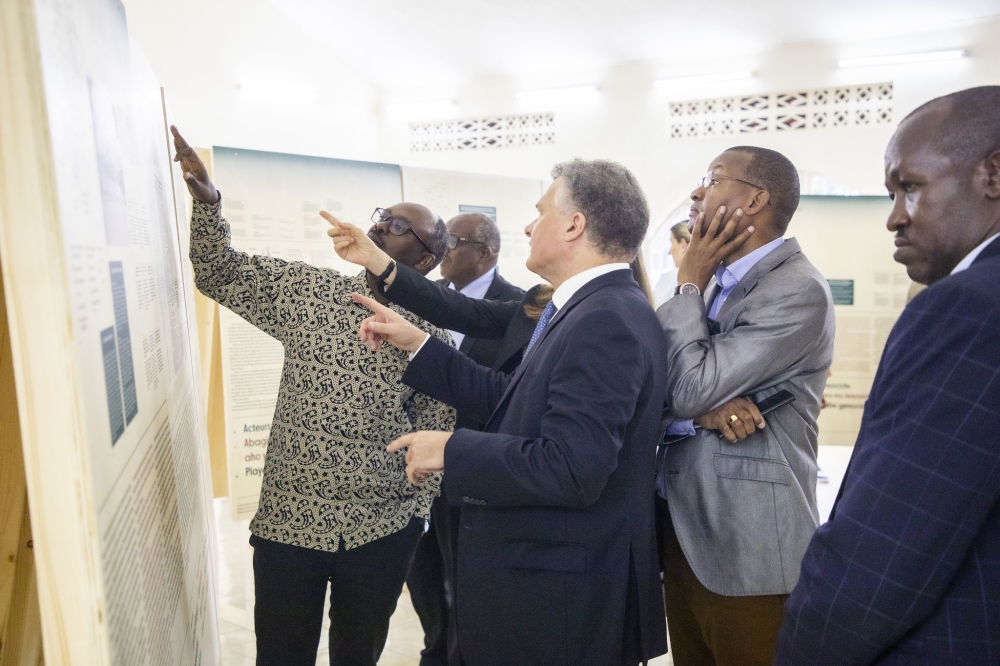

A powerful scientific exhibition dubbed "Traces of the Genocide Against the Tutsi" was on October 1 inaugurated at the Nyanza Genocide Memorial in Kicukiro District.
The three-week exhibition was jointly organised by &039;RwandaMap' research collective and 'Dusangire Amateka' (Let's share history) program under IBUKA, an umbrella of association of Genocide survivors.
It aims to present historical evidence of the 1994 Genocide against the Tutsi, ensuring the preservation of memory and the continuation of educational efforts for future generations.
"Dusangire Amateka" program, under which the exhibition falls, is an initiative that aims to share Rwanda's history with the broader public, focusing on building a shared understanding of the past and ultimately encourage a culture of unity, reconciliation, and collective remembrance among Rwandans.
ALSO READ: Genocide against the Tutsi: Grave consequences of truth manipulation
The opening ceremony was graced by a host of guests, including government officials, French envoy to Rwanda Antoine Anfré among others.
Clothes, bullet holes and bodies mummified with lime are among the key material traces of genocidal violence that can still be seen today at Rwanda&039;s memorial sites.
There are also invisible traces like traumatic memories, grief, frayed social bonds through which Rwandans continue to face the repercussions of a crime that has resulted in more trials than any other in history.
"Rwanda 1994. Traces of the Genocide against the Tutsi" explores what researchers consider a "trace" today.


The exhibition features a diversity of materials-records, eyewitness accounts and objects-that allow the genocide to be understood and integrated into the country's long history.
Focusing on the latest research, case studies and archives that have never been publicly seen before, the exhibition explores the main aspects of the Genocide: the conditions that laid the groundwork, the pace, places and killing methods and the impact on Rwandan society.
It also opens a window onto the role the Rwandan protagonists played and focuses fresh attention on the variety of approaches, sources and analytical methods used by Rwandan and international specialists to study a time when humanity failed.
ALSO READ: No Genocide happens without a plan, preparation, state involvement – Rwandan envoy
Addressing the press, Antoine Anfré, noted that "the exhibition is quite important because this is a result of the reconciliation between France and Rwanda."
"Unfortunately, France has a strong responsibility in what happened and blindly supported President Juvenal Habyarimana&039;s regime and because of the military support, the regime didn't collapse just after the attack of Rwanda Patriotic Front army (RPF)," he said.
The French envoy added that the support also encouraged the establishment of Interahamwe militias, and there were some killings even before the massive Genocide against the Tutsi which France actively supported.
"This exhibition gives a clear explanation of what happened. I'm encouraging Rwandan people, especially the youth, to visit because Rwanda is a very young country, and most of its population wasn't born when the 1994 Genocide against the Tutsi took place. They need to learn more about the history to ensure it doesn't happen again," he said.
The exhibition will run for three weeks before it shifts upcountry especially in Musanze and Huye Districts.
"Visitors will learn about the history, but they should also reflect on the question: 'Now that we know, what's next?” Ibuka president Philbert Gakwenzire said.
Gakwenzire said that, "Understanding the past is not enough if we do not take action to prevent similar atrocities in the future. The 1994 Genocide against the Tutsi, along with other genocides elsewhere, must never happen again. This is the message everyone should take away from their visit."
The exhibition opening was shaped a guided tour where attendees were able to explore each of the artefacts, maps, and testimonies presented.
It is open to the public and serves as an important reminder of the consequences of unchecked hate.


